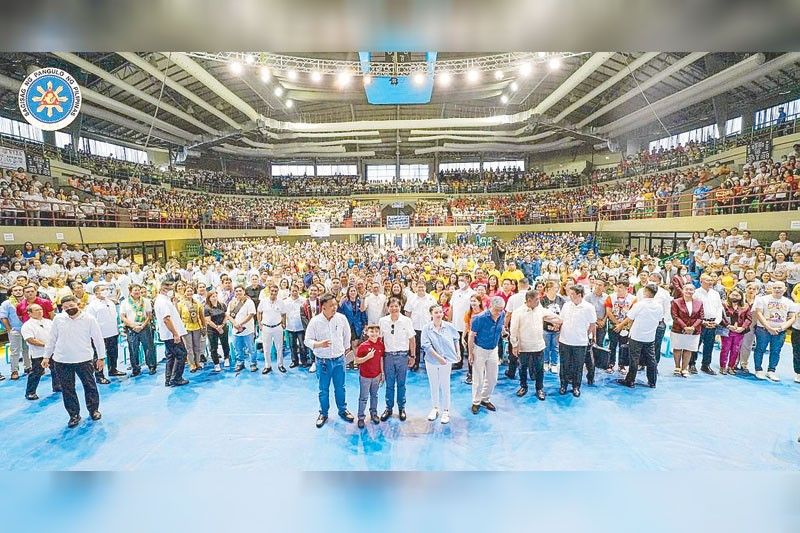Marcos inaugurates Davao City Coastal Bypass

MANILA, Philippines — President Marcos yesterday led the inauguration of a segment of the Davao City Coastal Bypass Road and witnessed the signing of a $1-billion loan agreement that seeks to modernize the local public transport system – projects that are seen to help promote economic activity in the region.
The Davao City Coastal Bypass Road Project is one of the major road projects designed to support the city’s urban infrastructure development plan. It seeks to enhance Davao City’s road network to meet traffic demands, promote suburban development and decongest the city center.
The project stretches from Jct. Davao-Cotabato, passing through the coastal lines of Bago Aplaya, Talomo, Matina Aplaya (Times Beach), Roxas Avenue Section to Santa Ana Wharf, then R. Castillo.
The 8.019-kilometer P10.3-billion Section A inaugurated yesterday, which covers the coastal lines of Bago Aplaya-Times Beach (Talomo-Matina), is part of the 17.783-kilometer project that costs P33,772,108,880 to complete.
Marcos noted that the road project forms part of the Philippine High Standard Highway Network, which aims to connect all of the country’s major islands.
“For this project in particular, the vision was to ease traffic congestion and, in turn, sustain and even boost the economic growth that Davao City has been enjoying in the past years until today. The objective is also to make the progress more inclusive and more relevant to everyone’s daily life through a highly interconnected road network,” he said.
The project will also help in moving goods in and out of the city, making access to basic necessities easier for communities, businesses and consumers, according to the President.
Part of the budget of the bypass road construction is allocated for the building of recreational green spaces.
Marcos credited his predecessor, former president Rodrigo Duterte, for the completion of the first phase of the project and directed the DPWH and other stakeholders to finish its remaining segments on time.
“Before anything, let me recognize the Vice President’s presence… today and who has decided to join us to see the fruition of a program, a project that started during her mayoral incumbency,” Marcos said, referring to Vice President and Education Secretary Sara Duterte.
The Chief Executive also thanked the Japan International Cooperation Agency and other development partners for sharing their expertise with the Philippine government to improve the country’s infrastructure.
He stressed that the “national government remains committed to pursuing high impact connectivity projects.”
The groundwork of the road project started in 2017. Once completed, the project will cut travel time from the Toril area going to the Davao City proper from one hour and 45 minutes to just 30 minutes.
Aside from the Vice President, other officials who attended the inauguration were Special Assistant to the President Secretary Antonio Lagdameo, DPWH Secretary Manuel Bonoan, Sen. Imee Marcos and vice-presidential sibling and Davao City Mayor Sebastian Duterte, among others.
Marcos also attended the signing of the $1-billion loan agreement for the Davao Public Transport Modernization Project between the Philippine government and Manila-based lender Asian Development Bank (ADB).
One of the big-ticket items under the administration’s Build, Better, More infrastructure program, the project will cover 672 kilometers with 29 routes that link key areas in Davao City to Panabo City, Davao Del Norte.
The project, which was envisioned as early as 2010, is expected to begin operations by 2024 and is projected to serve 800,000 passengers daily.
A total of 1,105 buses will operate along the routes.
Finance Secretary Benjamin Diokno and ADB Country Director for the Philippines Pavit Ramachandran signed the loan agreement.
Marcos described the project as “another milestone that heralds a very large leap toward realizing our goal to modernize our country’s public transportation system.”
“As it opens its doors to visitors and investors, the city will be rewarded with increased business opportunities. Increased commercial activities necessarily bring more people, which means more vehicles on the streets, busier roads and hence, heavier traffic,” he said.
“It is therefore the right time to commence this project. The project will have an integrated network of 29 routes and will connect major commercial centers in Davao and will yield various socio-economic opportunities for Davaoeños,” he added.
The project, according to the President, is made possible by financing from the ADB, which he labeled as the “country’s active and reliable partner in social and economic projects since its inception.” — Edith Regalado, Diana Lhyd Suelto
- Latest
- Trending


























